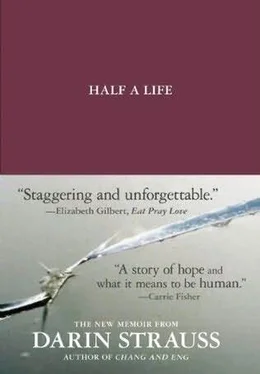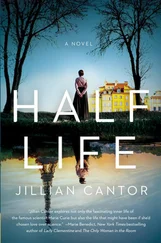She said something like, “It must be with you all the time, even now”—you know, something unimprovable. (Susannah is not a woman to drag her feet in platitudes.)
Because this was stress-free, I could follow my thoughts on their own steady glide, without hope or push.
“Yeah,” I said. “It’s pretty terrible.”
“I’m sure. But you seem okay, too.”
Almost overwhelmingly decent, levelheaded, very stubborn, Susannah’s a bit unpracticed at hardship. This leads to a defiantly virtuous optimism. It’s tough to be swamped with misery when you’re next to a person like that.
“Thanks,” I said. “I don’t know.”
I’m surprising myself by grinning now, just recalling this. There’s a pleasant, weird vibe you get from remembering a moment of early closeness with someone, in the time before you realized this closeness was going to become your life. And here again is where a split comes. I smile at that thought; I get to learn how that feels. Celine doesn’t. And I remember that she will never get to.
“I can’t even really imagine,” Susannah was saying. “And it’d probably be distasteful to pretend to try.”
She’s a tall perfectionist who looks like a soft-boned sister to the Faye Dunaway of Chinatown . The same high, regal forehead; tepid blond hair that wrongly gets called brown. She’s both striking and practical, somehow, like the string of rope lights around the banister that dangles and loops and steers you upstairs to a nighttime party.
This was probably date number five for us, and already I knew she made sense for me. It’s a question of rhythm: walking rhythm, thinking rhythm. Her mental pace seemed sensibly like my own. I’d look over, and she’d arrive wherever I was in a conversation, right next to me. And so I’d been measuring with dread how close we seemed to be getting, because if she did make sense, then I would have to tell her, and that would maybe end it all.
“Really,” I said now. “Thank you.”
“Of course — of course.”
Then we just went on with our relationship. Another bridge: going from not telling someone to having told her, to having that moment behind me. Until now, in every relationship, it had always been ahead of me. And then the relationship would vanish. Now was the first time I’d ever seen the other side of the bridge, and there was a person beside me.
3. To be fair to myself: I didn’t ever tell my story in a wheedling voice. I didn’t pursue sympathy as if I thought it was somehow the right payment for any psychic wounds suffered. I didn’t throw my sadness around. Most of all, I always remained awake to the only certainty there was: I am here and she is not.
“Hey, Darin,” people said. They slapped me on the back, they shook my hand with both of theirs. “You made it — you came.” I said, “Yeah.” I said, “Yup.” These were people I hadn’t seen since that pre-graduation speech. People who had watched the back of my eighteen-year-old head, watched my lurch for the exit.
Most everyone standing near me now had been balded by time, or at least a little gunked up in other ways — lumps, chins. But we were all doing a lot of generous ignoring. Here were people we had spent our childhoods with. They could not be replaced. North Shore High School, class of ’88, was sucking in its gut and stepping into a party. This was the denialathon that is a ten-year reunion: the bad luck and scraped knuckles of a decade gone by.
People who haven’t stood together for a long while greet one another in format, in banality. Everyone at the reunion was going out all at once into torrents of cliché—“I can’t believe it. Ten whole years! Amazing!”—into gusts of the same old stuff. “Look at you — exactly the same. Sophomore year, buddy. A decade! Man, you look … great?”
But everything for me seemed charged, sharpened; every conversation that never departed the shores of “Awesome” and “Good times, buddy — good times” was a relief.
It had taken me days to prepare, and the night before the reunion had been all choked stomach and thoughts that no one would be upset if I didn’t show because I hadn’t promised anybody. I went because I hadn’t wanted to go: it was the strongest, best reason to go. And because Celine wouldn’t get to attend hers, and we were in this together. Also, the part that hated being tied to Celine (the part thrilled by the collapse of the court proceedings, the part that read response-time library books and memorized a sentence from Celine’s journal, something she would never have wanted a boy in her high school to see) —that part needed to know if, after thirteen years of side-by-side desks and water fountains and time on the school lawn, these people thought of me as just some guy whose car killed a girl in the final bend of the school year.
Yes — another self-involved question. But a tragedy turns a life into an endless publicity tour, a string of appearances where you actually think in words like “tragedy.” I must admit that my having showed at Celine’s funeral and at her parents’ house had been in some measure marketing decisions. This endless focus group, trying to get my Q rating high enough, all to prove that I was acceptable.
There was also a little magical thinking at work here. I’d been able to convince myself lately that I’d begun “moving on.” If I’d paid a price for my role in Celine’s death, I’d paid with the wooden nickels of self-pity (in high school) and the rubber checks of denial (until this moment). So I showed up here thinking that maybe I could retype my high-school life entirely. As if one nostalgic evening could give my puberty an ending without drama, a calamity-free changeover to college: as if I could turn my memories into something like yours.
I walked through the murmur of reunion; it was like passing a long reel or frieze of hugging. Everywhere I turned, someone’s elbow was poking out from around someone else’s shoulder, a woman’s hair was bunched over a guy’s forearm. Women had taken one another’s hands by the fingers and just looked . (Women were so much better, still, at touching each other than men.) Ex-bullies chatted up their ex-targets. The jokes and grudges, the gossip and the forgotten social calamities: all these phantoms — in the face of time and change — simply dissipated for most people. At this last realization, my cringing nerves almost stopped me short and sent me home.
It seemed for me, and just me, that high school was still fresh: that a few minutes were in a Groundhog Day loop, were endlessly happening. That I even had the freedom to walk among these people amazed me.
“I’ve heard about lots of these,” a former wrestler (low center of gravity) was telling a former mathlete (elongated head poking above the crowd and somehow into gray equations). “And I’d say this is one of the best examples of high-school reunions I have ever heard about in all the years I have been hearing about them.”
“You’d need a bigger sample.”
“That makes zero sense whatsoever,” the ex-wrestler said. “Because who’s missing? Nobody. We were a tight class, is all. Everybody decided to drop what they’re doing and fly the flag, show their face. I’m seeing everybody I want to see. That’s a beautiful thing.”
“I’m only saying we’d need a statistical mean, for comparison.”
“Yeah, right on, nobody mean. Just good people you love.”
The evening resisted my taking its pulse. There was no way to get an accurate reading.
Up the flowered walkway, tug open the banquet door, enter the hall, and watch people’s nostrils stiffen as they catch sight of you. See their eyes double blink as they catch themselves about to give voice to the thoughts they aren’t supposed to say. All of this blew fresh life into the memory of my guilt. But how did I expect people to respond to me? I am the accident guy, after all. I circled the hall. Not as if I were a participant but a sort of avuncular, freelance referee: uninvolved, just making sure traffic was smooth. But then, wait; everyone was staring at everyone . This was just the Reunion Experience. You were seeing if time had cut you a better deal than it had everyone else. That’s all anyone was doing. And then everyone felt the helpless human tug toward nostalgia, convincing ourselves that something mattered because all of us had done it together.
Читать дальше









